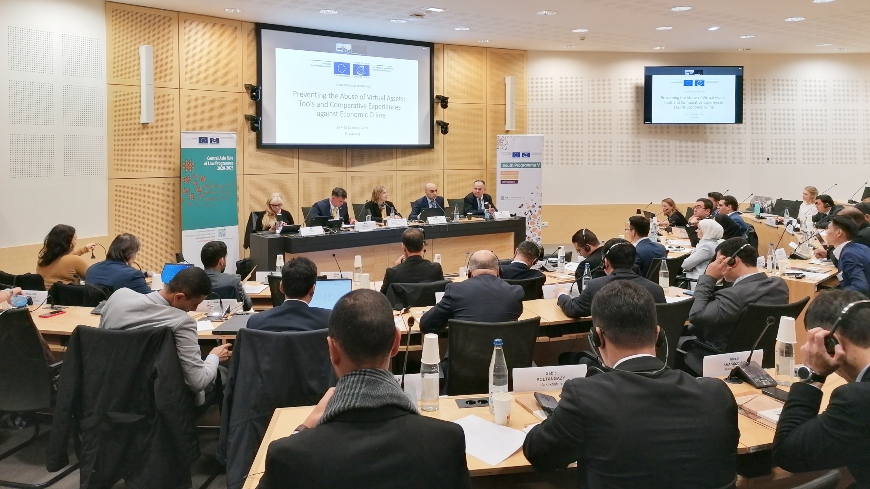The Council of Europe held a two-day workshop on “Preventing the abuse of virtual assets – tools and comparative experiences against economic crime” on 24-25 October 2023 in Strasbourg, France, as part of its technical cooperation activities in Central Asia, Kosovo*, and the southern Mediterranean.
This inter-regional workshop brought together more than 50 representatives of Financial Intelligence Units, Central Banks, Prosecution, Anti-corruption Authorities and other competent ministries and institutions from 12 Central Asian and Southern Mediterranean jurisdictions and Kosovo* with the aim of increasing practical knowledge and awareness of possible abuses of virtual assets for illicit activities.
The event also offered an opportunity to discuss existing practices and challenges experienced by the participating jurisdictions in virtual assets field. Participants discussed the practical implementation of international standards related to virtual assets and virtual asset service providers; alternative regulatory and institutional frameworks; common potential risks for the abuse of virtual assets for economic crime purposes; as well as issues related to freezing, seizure and recovery of virtual assets.
Contributions by the Financial Intelligence Units of Bulgaria, Lithuania and Poland, as well as by the Central Bank of Ireland, gave participants the opportunity to learn first-hand experiences about the practical challenges and advantages of the various alternative regulatory models for Virtual Assets Service Providers, their monitoring and supervision, and possible preventive and enforcement measures to be taken. Additionally, through the case studies presented, workshop participants increased their knowledge on how perpetrators use virtual assets for economic crimes and learnt practical tools to identify warning signs pointing to possible illicit acts.
The Committee of Experts on the Evaluation of Anti-Money Laundering Measures and the Financing of Terrorism (MONEYVAL) - the Council of Europe’s monitoring body to counter money laundering and the financing of terrorism – shared with participants the findings from their experience with Member States on the most prevalent money laundering and financing of terrorism risks related to virtual assets and their service providers. Moreover, workshop participants got acquainted with the ECCD’s dedicated risk assessment methodology related to virtual assets.
Participants agreed that it is of paramount importance for jurisdictions to assess and understand the level of risks of economic crimes related to virtual assets, as well as to mitigate them regardless of the chosen regulatory and institutional models. As the virtual assets has become an increasingly important topic, participants also convened on the importance of remaining aware of new trends and challenges, and that exchange of information amongst jurisdictions could be instrumental for that purpose.
The workshop was jointly convened by the Central Asia Rule of Law Project “Promoting Transparency and Action against Economic Crime”, the anti-corruption component of the South Programme V “SNAC5 - Promotion of good governance: fight against corruption, money laundering and financing of terrorism in the Southern Mediterranean”, and Project against Economic Crime in Kosovo” all of which are joint endeavours of the EU and the Council of Europe.
* This designation is without prejudice to positions on status, and is in line with UNSCR 1244 and the ICJ Opinion on the Kosovo Declaration of Independence.


